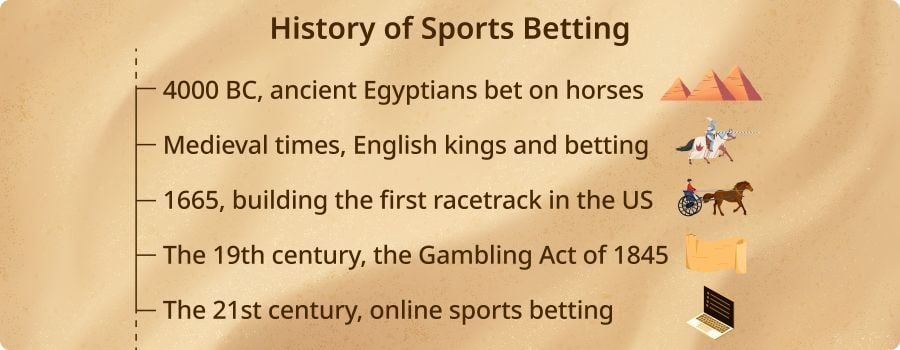The history of sports betting goes back much further than you would have thought and there have been a handful of key events over the centuries that have shaped sports betting into what it is today.
Here’s how we got here, how those events left their mark, why online sports betting shifted the goalposts and what the future may hold for sports betting.
The Origins of Sports Betting
It’s the Egyptians we have to thank for starting it all as far back as 4000 BC, and that’s our first port of call when looking at the history of betting.
Whether it was gambling on dice or board games, or sports such as fencing and chariot racing, their appetite for a punt was there long before anyone else’s. In addition to teaching the Romans a thing or two about such things as architecture and sculpture, they also educated them on the basics of betting and the thrill that came with it.
If you’ve ever watched the film Ben Hur, you’ll know all about the bloodthirsty, highly dangerous nature of chariot racing in the Roman Times. But what the film doesn’t really depict is the gambling element that went with it and its importance in sports betting history.
Huge sums of money traded hands, and who to bet on wasn’t as random as you’d think, with the study of the chariot racer’s form, the speed and health of the horse and the reputation of the chariot’s team all considered.
In the summer of 2024, all the best sports betting sites were laying odds on all the Olympic events in Paris, but at a far more basic level, the Greeks were already doing that around 700 to 800 BC.

Betting in Medieval Europe
Betting in medieval times included playing dice and tossing coins, even done during Sunday mass!
One of the first instances of a casino-like approach to betting was done at inns. Innkeepers acted as bankers and pawnbrokers, holding punters’ property in exchange for gambling money.
It wasn’t just the poor who had an insatiable appetite for a bet, though. None other than King Edward III lost £4 gambling, the equivalent of almost a year’s wages for a manual labourer. Another King, Richard I, had to ban betting when his army was in the Holy Land as it was getting out of control, distracting his troops from the job at hand.
Yet another King, James I, announced the first-ever British Lottery. Citizens bought tickets, they were entered into a drum or barrel, and the winner’s name was picked out.
The winner wasn’t the only one in clover because proceeds from the lottery were used to fund the Jamestown colony in America, where colleges, roads, canals, public buildings and religious buildings were bought with money from the sale of the tickets.
Some fifty years later, in 1665, British settlers on the other side of the pond built the first American racetrack, a key event in the history of sports betting in the United States.
Sports Betting in the 19th Century
Over in Britain, horseracing and betting on it had already been around since the 16th and 17th centuries, but that was mostly done between members of the gentry, in private, rather than being open to the public.
Yet another King, Charles II, this time, had a hand in making sure everyone could put their money where their mouths were, making attendance at the races open to the general public, who flocked to the biggest races in mass.
Meanwhile, innkeepers (them again) and pub owners lobbied for the races to be held near their own watering holes so they could run books, making them the first bookmakers in the history of sports betting UK.
Realising that drinking and gambling weren’t a good mix, the Gambling Act of 1845 banned betting at pubs, with betting shops being opened and bookmakers taking a far more hands-on approach now. That included taking bets, making a record of each wager and acting as arbitrators of such wagers in the process.
At the same time, over in France, Leon Sari was the mastermind behind the ‘pari mutuel’ in 1857, alongside Charles de Morny, owner of the Maisons-Laffitte racetracks. The concept of bettors playing against each other and the payouts being based on the popularity of the winning selection remains to this day, as seen by punters who bet with the Tote.
First Modern Betting Laws
Another key date in the history of sports betting in the UK is 1960, the year of the Betting and Gaming Act. It was designed to remove the gambling black market that was going on with illegal bookmakers taking bets from punters all over the country.
The aim of the Act was to legalise off-course betting by issuing licenses, of which 13,000 were handed out in the first year, to legal bookmakers.
Though this eliminated the nefarious nature of betting, it also contributed to the downfall of greyhound racing in Britain, with punters preferring the convenience of their local betting shop to traveling to the track.
Two years later, the first British casino, the Clermont Club, opened its doors on the back of the Act.
The 1968 Gaming Act reduced the number of casinos, promoted the scrutiny of bookies in terms of profits and their practices and helped reduce organised crime relating to betting.
Then, 37 years later, the 2005 Gambling Act addressed the emergence of online sports betting and, in the process, introduced fraud prevention, age verification, customer identity checks and advertising restrictions, all under the supervision of the UK Gambling Commission.
First Modern Bookies
Harry Ogden is seen as the Godfather of sports betting, given he was the first to price up all the runners in a horse race at the end of the 18th century. Before that, you only had two options: betting on the favourite or the field.
In 1923, Littlewoods, originally a retail company in Liverpool, began operating as a football pools company, with their flagship product being the “Treble Chance”, where players could choose to bet on 10, 11 or 12 football matches from the upcoming weekend.
After the Second World War, betting companies started offering the 1 (home win) x (draw) or 2 (away win) formula for football matches. But punters had to place accumulators rather than betting as singles, to reduce the possibility of manipulating matches for betting purposes.
Online Sports Betting
1994 saw Antigua and Barbuda granting licenses to betting companies wishing to provide gambling services over the Internet, with Intertops writing its name in the history of online sports betting as the first to take a bet this way in 1995. The likes of Malta and Kahnawake (Quebec) followed suit in terms of issuing licenses to remote operators.
Changes brought about by online betting included placing bets 24/7, the invention of in-play betting, the availability of more sports and markets to bet on than ever before and the introduction of bonuses.
All of the above contributed to the decline in the popularity of betting at land-based shops, with the convenience of placing a bet from home (betting on smartphones only came much later) also being a big factor.
Despite bookmaker shops cleaning up their act in terms of the appearance and comfort of their shops, they’re fighting a losing battle against the behemoth that is online sports betting.
A key date in the history of betting exchanges was 2000, when Betfair first launched, allowing customers to bet against each other rather than against the house.
The Most Famous Bets in History
Time to look at some of the most famous, remarkable or just odd sporting bets ever placed.
Alonso’s Lob is Not Too Xabi
It’s hard enough trying to predict who might score a goal in any given game but to predict exactly how it will be scored, as well, is taking things to another level, especially when the predicted manner of the goal is that it will be scored from before the half-way line.
Almost like he’d seen it unfold in a dream, Liverpool fan Adrian Hayward bet £200 that Xabi Alonso would score against Luton in a 2006 FA Cup tie from inside his own half, which he did. Hayward won £25,000 GBP and in his own words described the magic moment: I couldn't believe it when Luton got a corner, and the keeper started to run upfield…I thought I was going to pass out. When it went in, I went crazy.”
Parental Pride
Gerry McIlroy certainly wasn’t the first father of a golfing prodigy to be proud of his son’s (Rory McIlroy) prowess with golf club in hand. But he was the first to place a big bet on his son winning The Open within 10 years of the bet being struck, in 2004.
He was given odds of 500-1, as were friends of Gerry who jumped on the Rory bandwagon. Rory ended up winning it in 2014, the last year the bet was valid for, pocketing Gerry £100,000 and his pals £80,000. It’s also a reminder that reviews on betting operators don’t often include a mention that you can request odds on anything you like, but you can.
Lindgren Hits the Greens
Poker player Erick Lindgren liked a game of golf, and in one day, he played four rounds in the sweltering Las Vegas heat in the same day, shooting below 100 in each round from the pro tees. The reason? He’d bet he could play four rounds, all under 100, all on the same day. He won $340,000 off his poker pals.
The Future of Sports Betting
Sports betting has come a long way since Egyptians, Romans and Greeks were betting on chariot racing and the Olympics thousands of years ago.
We’ve seen that innkeepers near racetracks were the first to play bookie, how King Charles II openly promoted the attending of horse races and betting on them, how lotteries funded Britain’s first colony in the US, when the Pari Mutuel came about over in France and how several gambling acts contributed to legalising and regulating sports betting and casinos in the UK.
But the history of sports betting wouldn’t be complete without a look towards the future.
Livestreaming, Bet Builders, Cash Out, stats-focused markets like number of shots/fouls/saves in football and Odds Boosts are all somewhat recent additions to sports betting, meaning there’s little that’s left to be invented.
However, what the future may hold are more immersive experiences thanks to augmented reality and virtual reality, meaning customers can enjoy experiences similar to actually being physically present at the race or stadium while betting on the event.
More complex forms of gamification, where customers get greater rewards for placing bets or performing other tasks, may also be on the cards.
It's also very possible that in the near future, all sportsbooks will start accepting cryptocurrencies as a payment option.


